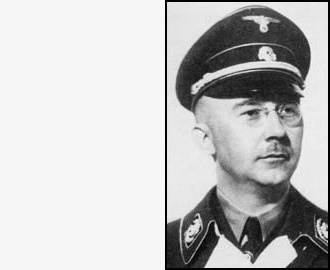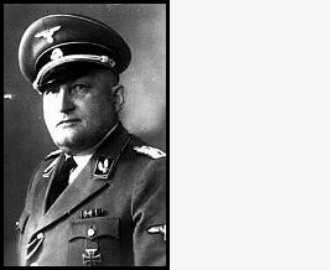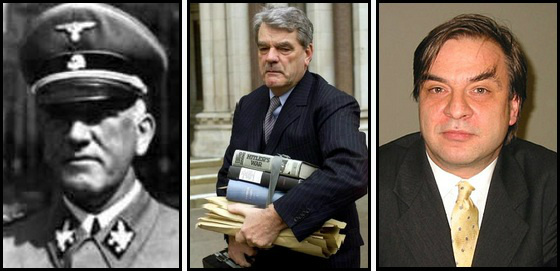
On the 28th December 1942, a letter from
the head of the SS camp administration office
was sent to concentration camps
including Auschwitz, which carried an order from
Himmler. It reads
"The SS Reichsfuehrer has ordered that the
death rate absolutely must be reduced."

SS-Gruppenführer Richard Glücks, the highest-ranking
Concentration Camp Inspector in Nazi
Germany, reiterated
Himmler's orders when he sent a letter on
January 20th, 1943
to concentration camps including Auschwitz,
instructing:
"every means must be used to lower the death
rate in the camp."
"I hold the Camp Commandant and the Chief of the
Camp Administration personally
responsible for exhausting
of every possibility of maintaining the
physical stength of the prisoners."

On January 25th, 2000 at the Irving vs. Penguin &
Lipstadt trial in London, David Irving &
defence witness German historian Dr. Heinz Peter
Longerich, discuss a October 1943 letter
from SS-Obergruppenführer Oswald Pohl,
chief of all concentration camps, to the camps:
IRVING: If you just look at the
first page of this document and run
your eye over it, is Pohl sending a
message to all the concentration
camp commandants, 19 of them,
saying: "It is time
to stop the rough and ready measures
with prisoners. We are losing them
like flies. We need their manpower.
Look after them better"?
LONGERICH: Well, first of all, I
have to express my reservations
about this document. I do not know
the context. I do not know the
archive. But on the assumption that
this is an authentic document, yes,
it is a letter to the 19 heads of
the concentration camps, and
obviously the document is saying
that they have to improve their
measures to keep prisoners alive, so
which is a kind of reference to what
happened in the camps before, I
think.
IRVING: Indeed, and paragraph 5 of
that first page says: "Not
from any false sentimentality but
because we need their arms and legs
because those are helping the German
people to get to a great victory.
That is why we have got to start
paying attention to the welfare of
the prisoners"?
LONGERICH: Yes. That is stated here
in this document.
IRVING: Then the next page, page 2,
the heading is, "Foodstuffs, food,
feeding"?
LONGERICH: I do not have the time to
read now.
IRVING: Well, I am just asking you
to look at the headings. That all we
need, I think. Page 2 he is talking
about the feeding. The following
page, paragraph 2, is called
"Clothing". Then down to the bottom
of that page, "Natural Medications"
or "Health" ----
LONGERICH: Yes.
IRVING: --- "stuff".
LONGERICH: Well, I cannot, you know,
I cannot read so fast but under
"Clothing" it is stated here: "I
decide that during the winter, as
far as far as available, prisoners
should wear coats, pullover, socks",
so that should give you an idea
about the standards which actually
existed in the concentration camps
before this letter arrived, and it
says, it says "as far as available",
so it does not actually say, "Give
the men, you know, proper clothing".
It is saying, you know, "You can
give them socks if they are
available and nothing more". So I
think this gives you a kind of an
idea of this.
IRVING: Over the page, paragraph 4
is called "Avoiding unnecessary
exertions". For example, these
frequent parades were they were held
standing for hours while they were
counted Zählappelle ----
LONGERICH: Yes.
IRVING: --- are to be kept as short
as possible, and so on. In other
words, there seems to be a reversal
of existing policy because they are
losing prisoners like flies to what
I would call non-violent causes.
LONGERICH: That is your
interpretation, yes.
MR JUSTICE GRAY: Well, what is
yours?
LONGERICH: Well, they started in the
concentration camps a programme
which they called "extermination
through work". So they used hard
labour as a tool, as a means to kill
prisoners. This was the practice
before. Now, at October '43, it is
not really surprising they are a bit
cautious here and they are trying to
improve as far as they can, trying
to improve in some sense the general
conditions of the prisoners. But, of
course, this is a document, I mean,
this document is, of course, sent to
the head of the concentration camps
-- nothing to do with the
extermination camps, for instance.
MR JUSTICE GRAY: I was going to ask
you about that.
LONGERICH: Yes. So, as far as
Auschwitz is concerned, it concerns
the slave labours within the camp.
It does not say anything about the
people who were deported to the camp
and selected in front of the camp.
If one, you know, if I have to -- if
I were in the position to give you a
kind of expert's opinion on the
condition in the concentration camps
at the end of 1943, I would not
completely rely on this document. It
would be completely unprofessional
to rely on this one document. One
has to look, of course, at all kind
of circumstances. One has to look at
the death rates. They had statistics
on the death rates and I had to look
at those, and so on. You know, the
problem with this kind of document
is that if you have not seen the
file, in the file in the next bit
you could find a document which
says, "Well, I recall my order from
last week". If you do not have the
context, it is difficult to make,
you know, a general statement as an
historian about the condition in
this camp, and whether they really,
you know, in the way gave up this
idea of extermination through work
in the end of 1943 and how far they
still carried on with this policy.





































